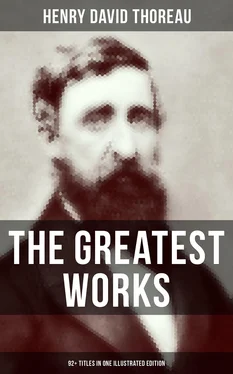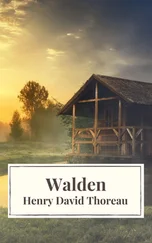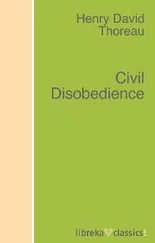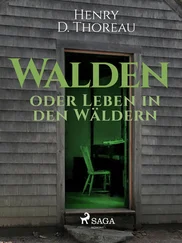I learned this, at least, by my experiment: that if one advances confidently in the direction of his dreams, and endeavors to live the life which he has imagined, he will meet with a success unexpected in common hours. He will put some things behind, will pass an invisible boundary; new, universal, and more liberal laws will begin to establish themselves around and within him; or the old laws be expanded, and interpreted in his favor in a more liberal sense, and he will live with the license of a higher order of beings. In proportion as he simplifies his life, the laws of the universe will appear less complex, and solitude will not be solitude, nor poverty poverty, nor weakness weakness. If you have built castles in the air, your work need not be lost; that is where they should be. Now put the foundations under them.
It is a ridiculous demand which England and America make, that you shall speak so that they can understand you. Neither men nor toadstools grow so. As if that were important, and there were not enough to understand you without them. As if Nature could support but one order of understandings, could not sustain birds as well as quadrupeds, flying as well as creeping things, and hush and whoa, which Bright can understand, were the best English. As if there were safety in stupidity alone. I fear chiefly lest my expression may not be extravagant enough, may not wander far enough beyond the narrow limits of my daily experience, so as to be adequate to the truth of which I have been convinced. Extra vagance! it depends on how you are yarded. The migrating buffalo, which seeks new pastures in another latitude, is not extravagant like the cow which kicks over the pail, leaps the cowyard fence, and runs after her calf, in milking time. I desire to speak somewhere without bounds; like a man in a waking moment, to men in their waking moments; for I am convinced that I cannot exaggerate enough even to lay the foundation of a true expression. Who that has heard a strain of music feared then lest he should speak extravagantly any more forever? In view of the future or possible, we should live quite laxly and undefined in front, our outlines dim and misty on that side; as our shadows reveal an insensible perspiration toward the sun. The volatile truth of our words should continually betray the inadequacy of the residual statement. Their truth is instantly translated; its literal monument alone remains. The words which express our faith and piety are not definite; yet they are significant and fragrant like frankincense to superior natures.
Why level downward to our dullest perception always, and praise that as common sense? The commonest sense is the sense of men asleep, which they express by snoring. Sometimes we are inclined to class those who are once-and-a-half-witted with the half-witted, because we appreciate only a third part of their wit. Some would find fault with the morning red, if they ever got up early enough. “They pretend,” as I hear, “that the verses of Kabir have four different senses; illusion, spirit, intellect, and the exoteric doctrine of the Vedas”; but in this part of the world it is considered a ground for complaint if a man’s writings admit of more than one interpretation. While England endeavors to cure the potato-rot, will not any endeavor to cure the brain-rot, which prevails so much more widely and fatally?
I do not suppose that I have attained to obscurity, but I should be proud if no more fatal fault were found with my pages on this score than was found with the Walden ice. Southern customers objected to its blue color, which is the evidence of its purity, as if it were muddy, and preferred the Cambridge ice, which is white, but tastes of weeds. The purity men love is like the mists which envelop the earth, and not like the azure ether beyond.
Some are dinning in our ears that we Americans, and moderns generally, are intellectual dwarfs compared with the ancients, or even the Elizabethan men. But what is that to the purpose? A living dog is better than a dead lion. Shall a man go and hang himself because he belongs to the race of pygmies, and not be the biggest pygmy that he can? Let every one mind his own business, and endeavor to be what he was made.
Why should we be in such desperate haste to succeed and in such desperate enterprises? If a man does not keep pace with his companions, perhaps it is because he hears a different drummer. Let him step to the music which he hears, however measured or far away. It is not important that he should mature as soon as an apple tree or an oak. Shall he turn his spring into summer? If the condition of things which we were made for is not yet, what were any reality which we can substitute? We will not be shipwrecked on a vain reality. Shall we with pains erect a heaven of blue glass over ourselves, though when it is done we shall be sure to gaze still at the true ethereal heaven far above, as if the former were not?
There was an artist in the city of Kouroo who was disposed to strive after perfection. One day it came into his mind to make a staff. Having considered that in an imperfect work time is an ingredient, but into a perfect work time does not enter, he said to himself, It shall be perfect in all respects, though I should do nothing else in my life. He proceeded instantly to the forest for wood, being resolved that it should not be made of unsuitable material; and as he searched for and rejected stick after stick, his friends gradually deserted him, for they grew old in their works and died, but he grew not older by a moment. His singleness of purpose and resolution, and his elevated piety, endowed him, without his knowledge, with perennial youth. As he made no compromise with Time, Time kept out of his way, and only sighed at a distance because he could not overcome him. Before he had found a stock in all respects suitable the city of Kouroo was a hoary ruin, and he sat on one of its mounds to peel the stick. Before he had given it the proper shape the dynasty of the Candahars was at an end, and with the point of the stick he wrote the name of the last of that race in the sand, and then resumed his work. By the time he had smoothed and polished the staff Kalpa was no longer the pole-star; and ere he had put on the ferule and the head adorned with precious stones, Brahma had awoke and slumbered many times. But why do I stay to mention these things? When the finishing stroke was put to his work, it suddenly expanded before the eyes of the astonished artist into the fairest of all the creations of Brahma. He had made a new system in making a staff, a world with full and fair proportions; in which, though the old cities and dynasties had passed away, fairer and more glorious ones had taken their places. And now he saw by the heap of shavings still fresh at his feet, that, for him and his work, the former lapse of time had been an illusion, and that no more time had elapsed than is required for a single scintillation from the brain of Brahma to fall on and inflame the tinder of a mortal brain. The material was pure, and his art was pure; how could the result be other than wonderful?
No face which we can give to a matter will stead us so well at last as the truth. This alone wears well. For the most part, we are not where we are, but in a false position. Through an infinity of our natures, we suppose a case, and put ourselves into it, and hence are in two cases at the same time, and it is doubly difficult to get out. In sane moments we regard only the facts, the case that is. Say what you have to say, not what you ought. Any truth is better than make-believe. Tom Hyde, the tinker, standing on the gallows, was asked if he had anything to say. “Tell the tailors,” said he, “to remember to make a knot in their thread before they take the first stitch.” His companion’s prayer is forgotten.
However mean your life is, meet it and live it; do not shun it and call it hard names. It is not so bad as you are. It looks poorest when you are richest. The fault-finder will find faults even in paradise. Love your life, poor as it is. You may perhaps have some pleasant, thrilling, glorious hours, even in a poorhouse. The setting sun is reflected from the windows of the almshouse as brightly as from the rich man’s abode; the snow melts before its door as early in the spring. I do not see but a quiet mind may live as contentedly there, and have as cheering thoughts, as in a palace. The town’s poor seem to me often to live the most independent lives of any. Maybe they are simply great enough to receive without misgiving. Most think that they are above being supported by the town; but it oftener happens that they are not above supporting themselves by dishonest means, which should be more disreputable. Cultivate poverty like a garden herb, like sage. Do not trouble yourself much to get new things, whether clothes or friends. Turn the old; return to them. Things do not change; we change. Sell your clothes and keep your thoughts. God will see that you do not want society. If I were confined to a corner of a garret all my days, like a spider, the world would be just as large to me while I had my thoughts about me. The philosopher said: “From an army of three divisions one can take away its general, and put it in disorder; from the man the most abject and vulgar one cannot take away his thought.” Do not seek so anxiously to be developed, to subject yourself to many influences to be played on; it is all dissipation. Humility like darkness reveals the heavenly lights. The shadows of poverty and meanness gather around us, “and lo! creation widens to our view.” We are often reminded that if there were bestowed on us the wealth of Croesus, our aims must still be the same, and our means essentially the same. Moreover, if you are restricted in your range by poverty, if you cannot buy books and newspapers, for instance, you are but confined to the most significant and vital experiences; you are compelled to deal with the material which yields the most sugar and the most starch. It is life near the bone where it is sweetest. You are defended from being a trifler. No man loses ever on a lower level by magnanimity on a higher. Superfluous wealth can buy superfluities only. Money is not required to buy one necessary of the soul.
Читать дальше












